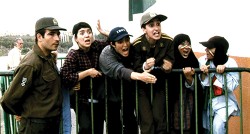In today’s global political climate, it’s easy for the average American to fall into a victimization mindset. We don’t understand why the people on television hate us so much, but we see the footage of angry throbbing masses and assume we’ve done something wrong. The media controls so much of our perception of the rest of the world—especially how other countries view America.
Stoppage time

COURTESY OF Jafar panahi film productions
FEMALE SOCCER FANS are barred from watching a match in 2006’s Offside.
In today’s global political climate, it’s easy for the average American to fall into a victimization mindset. We don’t understand why the people on television hate us so much, but we see the footage of angry throbbing masses and assume we’ve done something wrong. The media controls so much of our perception of the rest of the world—especially how other countries view America.
The fantasy of film can be a powerful tool; as we’ve seen in the past few weeks, it can spark intense and dangerous outrage. But it can also ground us, removing the sociopolitical barriers and placing us right alongside characters dealing with real problems and real feelings.
Offside will screen Oct. 12 as a part of the Middle East Studies Center’s “Being Young in the Middle East” film series. The film centers on a group of women in Iran who desperately want to watch a soccer match in Tehran, despite their country’s ban on women attending live games.
We watch as, one by one, individual women are escorted to a small outdoor jail inside the stadium. Each of them are dressed in men’s clothes in a vain attempt to bypass the guards. From their makeshift cell, they can hear the pulsing roar of the crowd. Only a few metal dividers, basically bike racks, stand between the women and the one thing they want most in the world.
The guards barring the women aren’t one-dimensional, mustache-twirling oppressive types. Far from being mean or abusive, the guards see themselves as just doing their jobs. Over the course of the film, the guards’ sympathies bend toward their prisoners. Hardly anyone in the film agrees with the sexist law—it seems mostly a matter of whether one wants to challenge the restriction or just accept the nature of the country’s reality. Not coincidentally, these perspectives are split pretty evenly between the genders.
The film was shot using a simple digital camera and unknown amateur actors. Combined with the complete lack of a musical score (save for the final minutes), this gives Offside a documentary-like feel. Though some of the long scenes are a little dull, the movie is not without a wry sense of humor. There’s a smattering of goofy dialogue, and some of the situations the women and their guards get into might even qualify as hijinks if this were an American sitcom. The dry reality of the film helps to build and punctuate these surreal laugh-out-loud moments.
Each of the six women has an emphasis on her character woven into the film, and not one feels forced or fake. Though none of them are named, there’s no mistaking the firebrand smoker from the timid girl we meet at the start. The women outshine the men in the film, who deliver their lines well enough, but lack the expressive zeal of the fairer sex. One could argue that the stiff portrayal of the guards was intentional, to make the everyday women even more approachable.
Not much happens in Offside. A group of women attempt to illegally attend a soccer game but are stopped. They’re held for a while. Then they all get on a bus. There are a few altercations along the way, but the film isn’t about set pieces or plot twists. More than anything, Offside is about humanity and how we deal with opposing sides that essentially have the same interests. Though the slower parts of the movie seem to crawl by, it only makes the comedic and dramatic crescendos that much more real.
Being Young in the Middle East film series:
Offside (2006)
Friday, Oct. 12 at 7 p.m.
Smith Memorial Student Union, room 294
Free and open to the public
This film is banned in Iran. The director, Jafar Panahi, has been arrested for making “propaganda against the Islamic Republic,” and sentenced to six years in prison. Panahi is also banned from making films in the country for 20 years. It’s the kind of horror story that contributes to the xenophobia that has been so prevalent in America, especially in the last 10 years.
Since Offside’s ban and Panahi’s imprisonment, the director has attained underground cult status: Offside has been widely distributed in Iran via pirated DVDs, and Pahani, while under house arrest in 2011, shot an “unfilm” that was snuck out of the country on a USB drive inside a cake.
Though it may sound like a trite headline or blurb, films like Offside remind the world that everyone else is just like us. Portland, in particular, with its rabid and devoted Timbers fans, will empathize with the plight of being barred from a game (though “sold out” and “locked out” are two very different things).
It might not have the thrills of something like Taken 2, but Offside is a funny, thought-provoking and very real film worth watching. Liam Neeson can wait for DVD.



